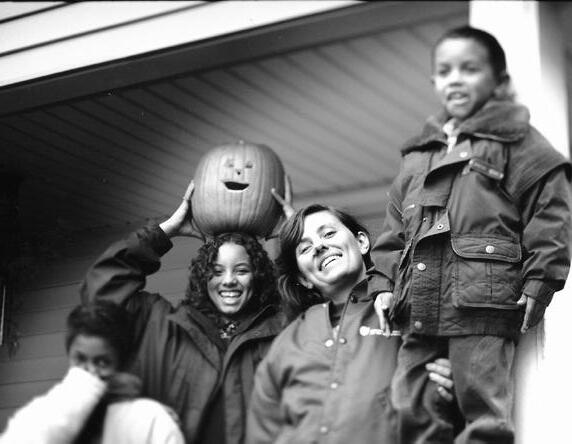Thursday, September 19, 2024
ICCF Community Homes at Age 50—
Our Defining Commitments
ICCF Community Homes is a strong and capable partner for churches and church members seeking to meet housing needs in response to God’s call to love our neighbor.
As we enter our sixth decade, ICCF will continue to enthusiastically welcome support from all sectors of our community. We will also continue to partner with churches and church members to mobilize their resources to meet housing needs.
ICCF Community Homes is devoted to EQUITABLE OPPORTUNITY across societal lines of race, ethnicity, economic status, gender identities and differing abilities.
ICCF was formed at a time when prejudice and institutionalized racism in real estate sales and mortgage financing was blatant in our community. While housing discrimination is far less flagrant today, ICCF’s work continues to alleviate the lingering effects of past injustice and counteract current inequities.
ICCF Community Homes’ commitment to AFFORDABLE HOMES has blessed hundreds of families who otherwise would not have been able to own their own homes.
From its earliest days to today, ICCF has helped people meet their housing needs in ways that also help them secure their future, making houses into homes while building equity and lasting value.
To meet this goal, ICCF’s renovation and construction methods, funding sources and purchase financing approaches have changed dramatically over the years to address local housing market shifts, from
• neighborhood disinvestment and neglect, to
• rising home prices fed by heavily marketed subprime mortgages, to
• widespread mortgage foreclosures and falling house prices, to
• rapid gentrification with skyrocketing rents and prices.
ICCF Community Homes’ commitment to AFFORDABLE HOMES has also been a blessing to hundreds of families and individuals with emergency, transitional and long-term rental housing needs.
ICCF is not a “one-size-fits-all” provider. Starting in 1990 with Family Haven and Carmody Apartments, ICCF has met immediate needs for a roof for the night, a transitional place to stay during tough times, and long-term rental homes for families and individuals.
ICCF Community Homes is committed to THRIVING NEIGHBORHOODS.
ICCF’s mission goes beyond the four walls around us and the roof above. We promote vibrant neighborhoods where there’s a shared sense of community and neighborliness, where there’s an appreciation for differing identities, for privacy, pride, and safety. Places with play areas for kids, front porches and gathering spaces for conversation and shared events. Places where people are optimistic and hopeful about the future. In a word, places that exemplify and extend God’s “Shalom”.
ICCF Community Homes provides education, counseling and other assistance to help people solve problems, develop competencies and secure a future for themselves and their kids.
ICCF is more than a bricks-and-sticks organization. People need reachable stair-steps and hand-holds to move from despair to hope, from homelessness to housing security. ICCF is people-focused and future-oriented.
ICCF Community Homes loves to bring old buildings back to life.
Restoring old buildings is a tangible reflection of God’s redemption in our world. What’s ruined is restored, what was lost to disrepair and neglect regains vitality, purpose and beauty.


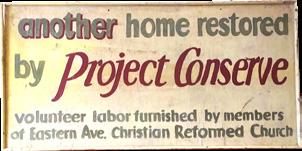







ICCF’s Earliest Volunteers
Before ICCF Community Homes became officially incorporated, before there was one paid staff member, before there was even an office, there were volunteers.
The beginnings of what would become ICCF started when an elderly woman named Mary Van Houte donated her house to Eastern Ave. Christian Reformed Church in 1973. At the same time, the congregation’s Social Concerns Committee had begun discussing ways they could alleviate the urgent housing needs in their neighborhood.



The following year, in 1974, eight people from the church put the two ideas together, pooled their money, and purchased the home from the church. Over the course of a year, working largely on weekends, they refurbished the house beautifully and sold it to a local family. They dubbed this new venture “Project Conserve.”
Among those first Project Conserve members were Marlin Feyen, Vonnie Feyen, Ed & Ruth DeVries, Bob & Norma Van Koevering, Bill & Annette Byl, Frank & Sally Jonkman, John & Evelyn Hamstra, and Phil & Lynn Hamstra. The next year, more friends joined Project Conserve, including Gilbert & Hermie Besselsen, Don & Minnie Hunderman, and Pete & Mary Niewiek.
Annette Byl shared, “We credit God’s blessing for the growth of Project Conserve and later ICCF, and the impact they have had in our

community.” Ed DeVries added,“We looked at it more like an opportunity than a challenge. We wanted to do something that would benefit the community.”
This small group of hardworking volunteers responded to the needs of their community in a tangible, back-breaking, and costly way. Pouring out their own time, energy, and funds, they created a place where one, then two, and then a dozen, and now hundreds of families find safety and stability. ICCF’s original volunteers identified a need, saw they could make a difference, and jumped in to help their neighbors. 50 years later, their work is still making a difference.

Highlights from ICCF’s Early Days,
1974–1992

Beginning with a house donated to a church, a small group of volunteers work to renovate single-family homes and sell them to local families.



When a federal mortgage subsidy program is eliminated, the resourceful team pivots to providing home repairs for a season.

1974


1977
1982
1985
After incorporating and hiring a couple of employees, the organization continues renovating an increasing number of homes.


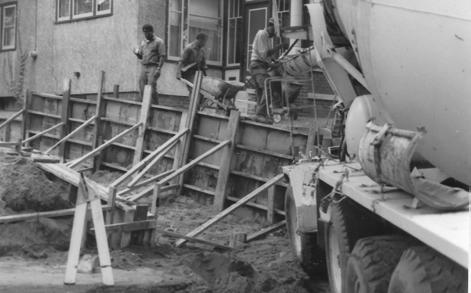









A new lease/purchase program is launched, creating another path to homeownership. The organization invests in homeownership counseling for neighbors. A $1 million loan from MSHDA is utilized to renovate 50 homes over the next 9 years for lease/purchase, and repaid in full.












ICCF purchases, renovates, and occupies a former City of Grand Rapids fire station at 816 Madison SE.




Undertaking their first new construction, the organization builds Pleasant Prospect Homes. The scattered-site rental development includes 15 affordable duplexes, beautifully designed to blend in with the existing neighborhood.





Recognizing an opportunity to care for families experiencing homelessness, Family Haven is constructed. The first multifamily apartment building, Carmody Apartments, is purchased & renovated to provide affordable rental opportunities.









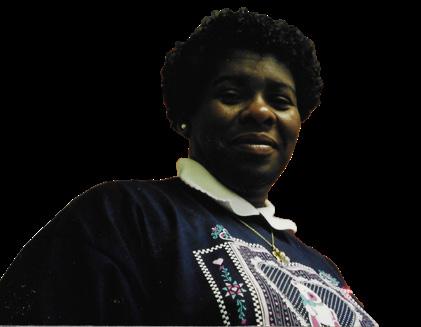
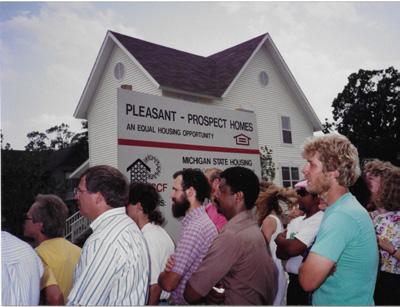
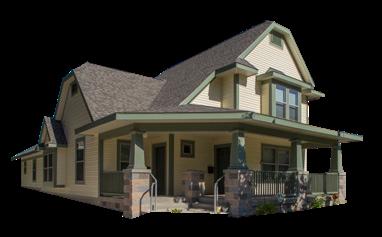



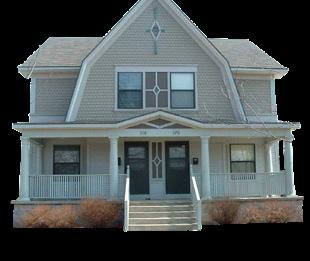

















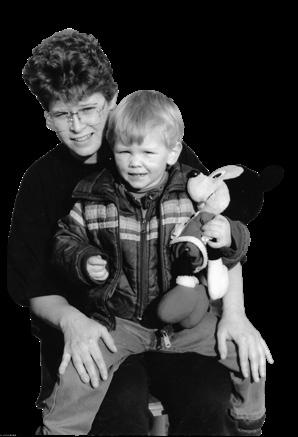




Highlights from 1994–2016


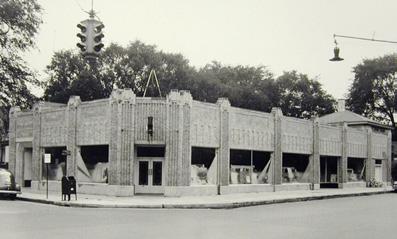






A lot is purchased in the first move toward what will become the Wealthy Jefferson Initiative, later called Tapestry Square.
ICCF held a variety of design charrettes over the next decade to gather community input.









ICCF moves into the former D.A. Blodgett Home for Children at 920 Cherry, which it has spent two years renovating after saving the building from demolition. As a recession hits, ICCF provides foreclosure intervention services to hundreds of local families.
A former warehouse at 515 Jefferson becomes a secondary office space, nicknamed the Housing Opportunity Center.
ICCF builds its first single-family new home from the ground up and the construction program grows dramatically over the next ten years, renovating or building 8–20 homes annually. The first homeownership training class is held with a curriculum written by ICCF staff and later adopted by the Michigan State Housing Development Authority (MSHDA) for use across the state.










ICCF continues to expand its homeownership education services with the Introduction to Homeownership program, credit remediation, financial literacy classes, and home maintenance education. Individual Development Accounts (IDAs) help participants reach their homeownership goals through a match savings program.















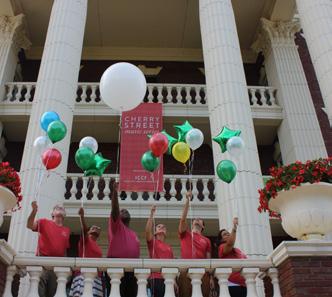












ICCF’s mixed-used, mixedincome housing developments 100 and 150 Wealthy open in Tapestry Square.



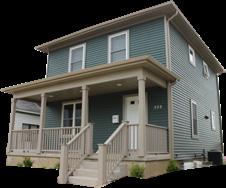







After an incredible tenure of 34 years, Jonathan Bradford retires and Ryan VerWys is welcomed as the new CEO.






Construction begins on 24 units of mixed-income, mixed-use housing in Tapestry Square at 435 LaGrave, with 6 units designed for use by youth aging out of foster care.

From the Forgotten Corner to Tapestry Square
In the 1990s, ICCF, Southeast Community Association (SECA), and other community stakeholders began conversations about the neighborhood radiating out to the southeast from the corner of Division Ave. and Wealthy St. Once a bustling residential community alive with schools, churches, and over 40 businesses, by the late 1990s this area had become known as the Forgotten Corner Neighborhood, having lost over 80% of its residents and all but one of its businesses.
With a vision for full neighborhood revitalization, ICCF began to acquire vacant parcels and dilapidated structures in the four-block area to the southeast of that Division/Wealthy intersection. At the same time, with funding and assistance from a number of businesses and foundations, as well as city and state governments, a plan was developed to recapture the energy of this once healthy neighborhood, informed by community research, stakeholder surveys, urban planning best practices, and a Biblical vision for shalom.
In 2012, ICCF chose to name this emerging revitalized neighborhood “Tapestry Square.” Like a tapestry which is made both strong and beautiful by the diversity of materials that are interwoven, Tapestry Square seeks to be a strong, healthy, vibrant urban neighborhood where a diverse group of people live, work, shop, thrive, and enjoy life. Today, after three decades of planning and construction, Tapestry Square contains more than 200 housing units, 9,000 SF of retail space, and the innovative Grand Rapids University Preparatory Academy for grades 6–12.
Tapestry Square and surrounding neighborhoods.

Highlights from 2017–Present











ICCF's five-story apartment building The Stockbridge takes shape with 64 apartments, conveniently located close to a grocery store and public transportation near downtown Grand Rapids. The Community Homes Land Trust is founded to provide affordable homes for income-qualifying neighbors while ensuring that those homes remain affordable for future generations.









ICCF moves into 415 Martin Luther King Jr. St. SE, renovating a former high school. The project is made possible through collaboration with Madison Church and includes 40 affordable apartments, office space, worship space, and an early childhood learning center. ICCF also opens Emerald Flats apartments, an award-winning renovation of another former school building into multifamily housing, including several units set aside for people with disabilities. Three new homes are constructed in Cedar Springs.
2019 2021 2017 2020
ICCF purchases 270+ homes, later called the Community Homes Initiative, from an out-of-state investor, with the goal of renovating and renting homes to income-qualifying families.
















A ribbon cutting is held for the grand opening of Steepleview North and South, two mixed-use apartment buildings with 65 units total, including live-work units on the ground floor.
Family Haven celebrates 30 years of serving families with emergency shelter and opens a new, 6th unit of housing.





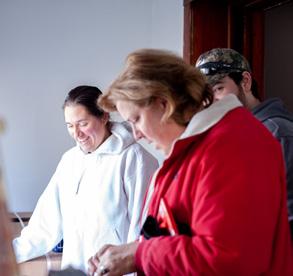
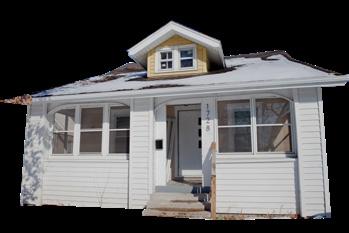










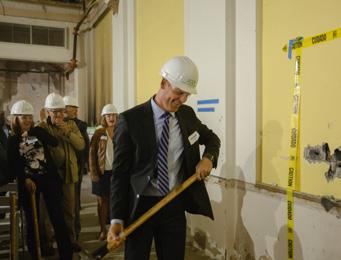















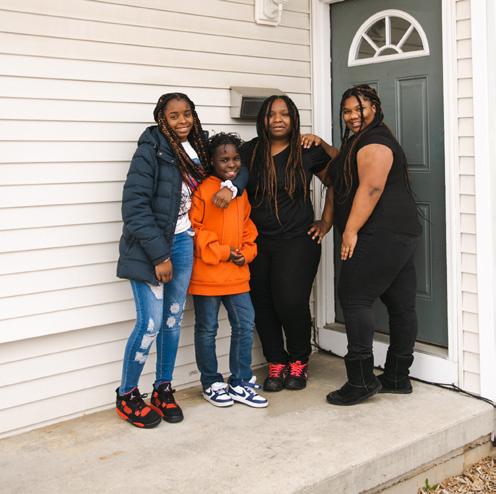
2022
ICCF unveils a new name and brand identity that better describes its mission and activities: ICCF Community Homes. In partnership with a local builder, ICCF celebrates the ground-up construction of a new, single-family home, part of the Community Homes Land Trust.





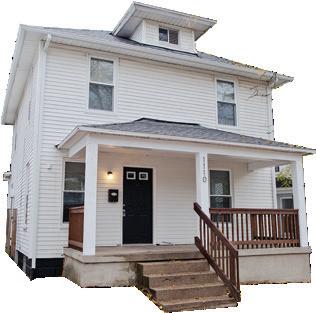


The four-story residential development called The Southgate opens with 56 units of senior housing near the heart of downtown Grand Rapids. Five more land trust homes are built, filling formerly empty neighborhood lots.



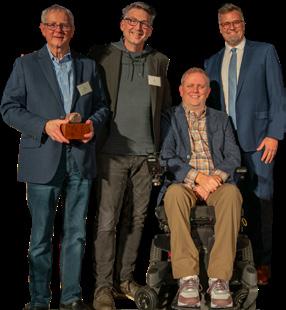

2023










2024 & BEYOND
Looking ahead, ICCF identifies the need for 35,000 new homes in Kent County before 2027, with 15,000 affordable units. Initiatives like The Seymour, church-partnered affordable housing, and innovative programs will help meet this need. ICCF celebrates its 50th anniversary in 2024, thanking God for its success so far and asking for blessing on future endeavors.











Highlights on the Horizon
We look forward to serving our neighbors through more affordable homeownership opportunities, more affordable rental homes, more faith-based partnerships, and more thriving communities.
2017 Eastern Ave SE
The building was built in 1951 for Herm’s Supermarket and was imagined as a “modern” design which would offer generous off-street parking for customers, along with 15 offices for small businesses on the second floor of the building. The market was eventually unable to compete with larger grocery store chains, and the 1st floor space fell into disuse by 1965. By the early 1980s most upper-level businesses had also moved on. In 2023 a Michigan state grant allocated $1,059,256 for redevelopment of the building. ICCF is in the process of finalizing plans for the creation of 15 affordable rental apartments with 1 and 2 bedrooms in the vacant space behind the Post Office, which will remain at the front of the building.



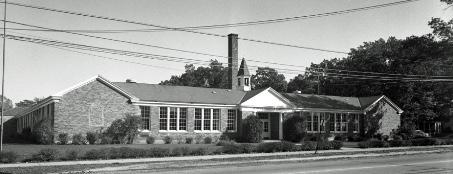





BUILDING INTO THE FUTURE

The Seymour
This building was originally constructed in 1943 and served for 82 years as Seymour Elementary School, a private school founded in the Christian Reformed tradition. The property was purchased by ICCF from long-time partner and supporter Tabernacle Church in November 2020. The building will be transformed into 27 affordable condominium homes in the Alger Heights neighborhood, creating 2 and 3-bedroom condos from the vacant, former school building. This development is the first in Michigan to be approved for the new Housing Tax Increment Financing tool, which piggybacks on funds previously designated only for clean-up sites but can now be used to help offset the difference between actual development costs and actual sales price of the properties. Funding will also come from a $1.6 million federal appropriations grant supported by Representative Hillary Scholten.
1309 Madison Ave SE
The building at 1309 Madison represents a long and important legacy in the neighborhood, serving for 51 years as a grocery store beginning in 1939 and owned by national grocery brands, as well as by local grocery entrepreneurs, for a time hosting the largest African American business in Michigan. After the grocers moved to another location, the building was home to a day care center for 17 years. ICCF is working to finalize funding for the property on both sides of Eastern Avenue SE. The sites will be transformed into two 3-story buildings providing 45 affordable rental homes, including 1 and 2-bedroom apartments, as well as common areas, amenities for residents, green space, and dedicated parking.





BUILDING INTO THE FUTURE



Pilgrim Rest Townhomes
ICCF is in the planning stages of a partnership with Pilgrim Rest Missionary Baptist Church to create five affordable townhomes as 2 and 3-bedroom rental units on church-owned land. The use of church property and the church’s proximity will help create an avenue to provide services and support, demonstrating the principles of Biblical grace and justice and showing the love of Jesus in the community.














